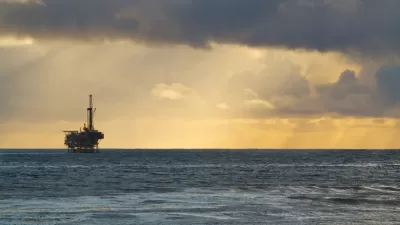In a precedent-setting action that supporters call creative and opponents view as abusive, President Obama has declared a permanent drilling ban off the Atlantic coast from Virginia to Maine and along much of the Alaska coast. But will it last?
"Tuesday’s announcement would ban drilling in about 98 percent of federally owned Arctic waters, or about 115 million acres, a pristine region home to endangered species including polar bears and bowhead whales," writes Coral Davenport, climate and energy reporter for The New York Times. "It would also block drilling off the Atlantic Coast around a series of coral canyons in 3.8 million acres stretching from Norfolk, Va., to the Canadian border."
In January 2105, a mere day after the Interior Department announced it would permanently block drilling in much of the Arctic Refuge, the president agreed to allow drilling in federal waters from Georgia to Virginia, in the Gulf, and some areas off Alaska.
The ban enacted on Dec. 20 invoked "an obscure provision of a 1953 law, the Outer Continental Shelf Lands Act, which [Obama] said gives him the authority to act unilaterally," adds Davenport.
“It’s never been done before,” said Patrick Parenteau, a professor of environmental law at Vermont Law School. “There is no case law on this. It’s uncharted waters.”
"By taking this route, rather than issuing an Executive Order, Obama made it legally difficult for Republican President-elect Donald Trump's administration to reverse this action," reports Steve Horn for EcoWatch.
Opponents view
“We are hopeful the incoming administration will reverse this decision as the nation continues to need a robust strategy for developing offshore and onshore energy,” said Erik Milito with the American Petroleum Institute.
"Fortunately, there is no such thing as a permanent ban, and we look forward to working with the new administration on fulfilling the will of American voters on energy production.”
According to API, "[a] permanent withdrawal conflicts with Congress' stated purpose in creating the Outer Continental Shelf Lands Act (OCSLA), which was to make the outer continental shelf 'available for expeditious and orderly development.'"
"Mr. Obama’s legal experts say they are confident that the ban will withstand legal challenge," adds Davenport. "They point to the specific language of the law: 'The president of the United States may, from time to time, withdraw from disposition any of the unleased lands of the Outer Continental Shelf.'”
Joint action taken with Canada
The president's conservation actions were complemented by those of Prime Minister Justin Trudeau of Canada, who simultaneously announced a review of the federal government's Arctic strategy and agreed to a joint drilling ban with U.S., according to the CBC News. Unlike Obama's ban, though, Trudeau agreed to a review of policy every five years.
In their joint statement, they referenced energy, environmental, and Arctic initiatives the two leaders agreed to in March, each designed to limit climate change and "to strengthen the resilience of Arctic communities and continuing to support the well-being of Arctic residents."
FULL STORY: Obama Bans Drilling in Parts of the Atlantic and the Arctic

Planetizen Federal Action Tracker
A weekly monitor of how Trump’s orders and actions are impacting planners and planning in America.

Congressman Proposes Bill to Rename DC Metro “Trump Train”
The Make Autorail Great Again Act would withhold federal funding to the system until the Washington Metropolitan Area Transit Authority (WMATA), rebrands as the Washington Metropolitan Authority for Greater Access (WMAGA).

The Simple Legislative Tool Transforming Vacant Downtowns
In California, Michigan and Georgia, an easy win is bringing dollars — and delight — back to city centers.

The States Losing Rural Delivery Rooms at an Alarming Pace
In some states, as few as 9% of rural hospitals still deliver babies. As a result, rising pre-term births, no adequate pre-term care and "harrowing" close calls are a growing reality.

The Small South Asian Republic Going all in on EVs
Thanks to one simple policy change less than five years ago, 65% of new cars in this Himalayan country are now electric.

DC Backpedals on Bike Lane Protection, Swaps Barriers for Paint
Citing aesthetic concerns, the city is removing the concrete barriers and flexposts that once separated Arizona Avenue cyclists from motor vehicles.
Urban Design for Planners 1: Software Tools
This six-course series explores essential urban design concepts using open source software and equips planners with the tools they need to participate fully in the urban design process.
Planning for Universal Design
Learn the tools for implementing Universal Design in planning regulations.
Smith Gee Studio
City of Charlotte
City of Camden Redevelopment Agency
City of Astoria
Transportation Research & Education Center (TREC) at Portland State University
US High Speed Rail Association
City of Camden Redevelopment Agency
Municipality of Princeton (NJ)




























